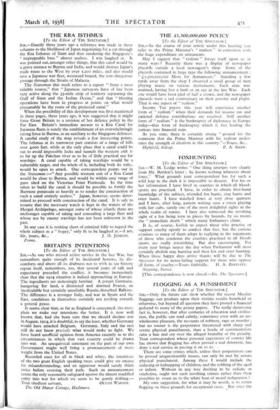THE KRA ISTHMUS
[To the Editor of THE SPECTATORT
SIR,—Exactly three years ago a reference was made in these columns to the likelihood of Japan negotiating for a cut through the Km Isthmus of Siam and thus rendering the Singapore's " impregnable base " almost useless. I was laughed at. It was pointed out, amongst other things, that this canal would be a grave menace to Burma and India, and would shorten Japan's trade route to the West by over 1,000 miles, and also would save a Japanese war fleet, westward bound, the now-dangerous passage through the Straits of Malacca.
The Statesman this week refers to a report " from a most reliable source," that " Japanese surveyors have of late been very active along the 33-mile strip of territory separating the Gulf of Siam and the Indian Ocean," and that " blasting operations have been in progress at points oh what would presumably be the route of the projected canal." When the possibility of this development was first mentioned in these pages, three years ago, it was suggested that it might force Great Britain to a revision of her defence policy in the Far East. Britain's immediate answer to a Kra Canal for Japanese fleets is surely the establishment of an overwhelmingly strong force in Burma, as an auxiliary to the Singapore defences. A careful study of the map reveals a few interesting points. The isthmus at its narrowest part consists of a range of hills over 4,000 feet, while at the only place that a canal could be cut to avoid impossible locks and tunnels the western exit is so far up the Pakchan river as to be of little practical use for warships. A canal capable of taking warships would be a vulnerable target, and the whole of it, including both its exits, would be open to attack. One correspondent points out in the Statesman .—" Any possible western exit of a Kra Canal would be dose to Burma, and would be within easy range of guns sited on the Victorian Point Peninsula. In the time taken to build the canal it should be possible to fortify the Burmese peninsula so heavily as to render the construction of such a canal entirely useless." Japan, however, seems deter- mined to proceed with construction of the canal. It is safe to assume that the necessary watch is kept in the waters of the Mergui Archipelago, amongst some of whose islands there are anchorages capable of taking and concealing a large fleet and whose use by enemy warships has not been unknown in the past.
In any case it is nothing short of criminal folly to regard the whole subject as a " bogey," only fit to be laughed at.—I am,














































 Previous page
Previous page